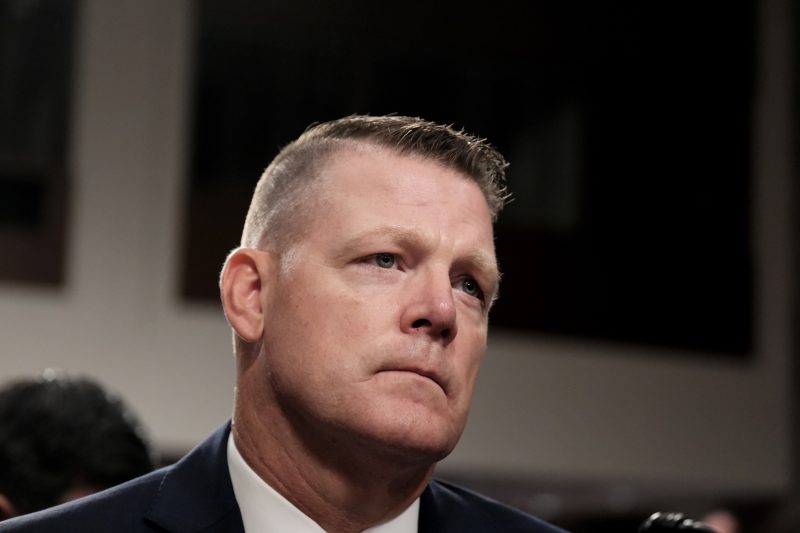
Secret Service head says he’s ‘ashamed’ of security failure around Trump
The acting head of the Secret Service told lawmakers Tuesday that he was “ashamed” his agency failed to secure the rooftop where a gunman fired on former president Donald Trump, sparring at times with angry Republicans who demanded he fire people immediately over the security shortcomings.
“I cannot defend why that roof was not better secured,” Ronald Rowe Jr. told a joint Senate committee examining the assassination attempt at a campaign rally in Butler, Pa., on July 13.
Firing at the GOP presidential candidate, the gunman killed one person in the crowd and critically injured two others. One of the bullets grazed Trump’s ear.
At times, the hearing turned emotional and even angry, particularly when Sen. Josh Hawley (R-Mo.) loudly called for people to be ousted from the agency.
“Sir, this could have been our Texas schoolbook depository,” Rowe told the lawmaker, referring to the 1963 assassination of President John F. Kennedy. “I have lost sleep…”
“Then fire somebody,” Hawley hollered at him.
Raising his voice in response, Rowe said he would let the investigation play out before delivering punishments.
“I will tell you, Senator, I will not rush to judgment,” Rowe said. “This was a failure and we will get to the bottom of it.”
“Well, I hope you’re going to do something about it,” Hawley retorted.
Rowe told lawmakers from the Senate Homeland Security and Governmental Affairs Committee and the Senate Judiciary Committee that he visited the site after the disastrous security failure, including the rooftop from which the 20-year-old gunman, Thomas Matthew Crooks, fired eight shots from an AR-style rifle.
“What I saw made me ashamed,” Rowe said. He became the acting director of the agency a week ago, following the resignation of Kimberly Cheatle under pressure from lawmakers and others. Rowe previously served as deputy director of the Secret Service, responsible for overseeing daily investigative and protective operations.
Raising his voice in frustration, Rowe showed lawmakers photos of the rooftop, near where officials have said local law enforcement officers were posted.
“I cannot understand why there was not better coverage” of that roof, Rowe said. “I think this was a failure of imagination, a failure to imagine that we actually do live in a very dangerous world where people do actually want to do harm to our protectees. I think it was a failure to challenge our own assumptions.’
Rowe said the Secret Service assumed there would be “sufficient eyes” from local law enforcement covering the outer perimeter of the rally, including counter sniper teams in the AGR building from which the shooter fired.
“We assumed that the state and locals had it,” Rowe said in response to questioning from Sen. John Cornyn (R-Texas). “I can assure you that we’re not going to make that mistake again.”
Going forward, Rowe said, Secret Service counter snipers will join local counter snipers on the roofs and other locations, similar to the way they handle security at the United Nations General Assembly in New York.
“I’ve directed that when we’re talking to people and we’re making requests, that we are very specific about what we want, we are providing explicit instructions,” Rowe said.
The agency has already decided to use more drones around such events, he added, and to improve radio communications between the Secret Service and other law enforcement agencies that contribute to their security.
Lawmakers at the hearing, particularly Republicans, criticized the Secret Service over the failure to stop the gunman from climbing onto the roof just outside the rally’s security perimeter and suggested Cheatle’s resignation was not enough.
Sen. Gary Peters (D-Mich.), chairman of the Homeland Security Committee, said Congress needs answers “about what appears to be a problematic communications system” used by the Secret Service.
Before the shooting, local police assisting with security at the event had spotted the suspicious young man, but much of that information was not relayed to the Secret Service agents who are part of the former president’s security detail.
FBI Deputy Director Paul Abbate said that while investigators still don’t have a sense of the gunman’s motive, they have recently discovered a set of online posts believed to have been made by him in 2019 and 2020 that reflect “antisemitic and anti-immigraton themes” and espoused political violence.
“This was just discovered and it is being closely analyzed right now,’ Abbate said, cautioning that agents still need to verify that the posts were made by the gunman. Previously, investigators briefly thought an online post about the date of the assassination was made by the shooter, before deciding that it was not.
Abbate said if the posts do turn out to have been written by Crooks, “it is the first indication that he is expressing… extremist views and talking about political violence.”
Sen. Rick Scott (R-Fla.) chided the agency officials for not speaking in public more often about what happened and what investigators have found.
“You’ve allowed the public to assume the negative, which I don’t get. I think you should have been doing all along at least once-a-day press conferences. I think you’ve got to tell the public what’s going on,” said Scott. “You ruin your reputation, impact the integrity of the federal government, it makes no sense to me.”
This is a developing story. It will be updated.
